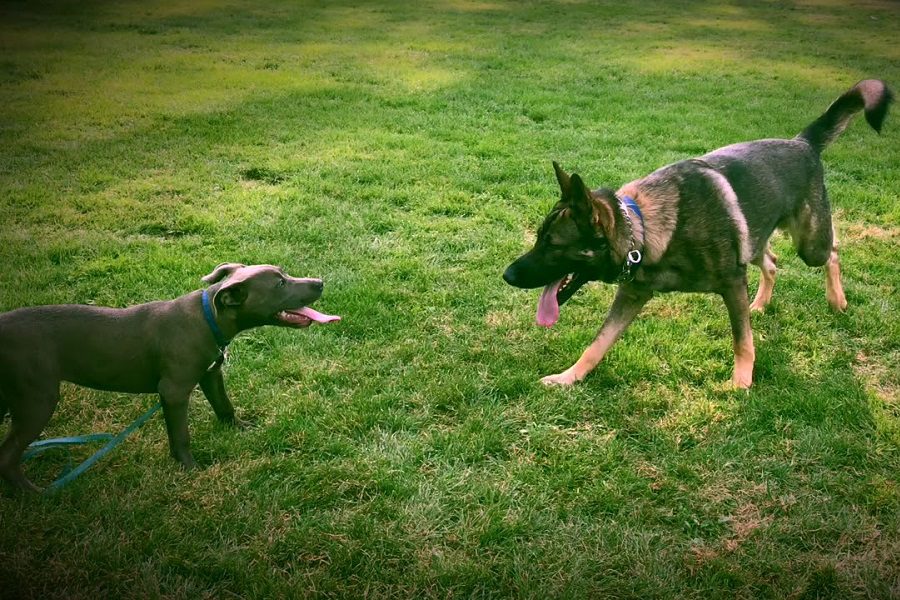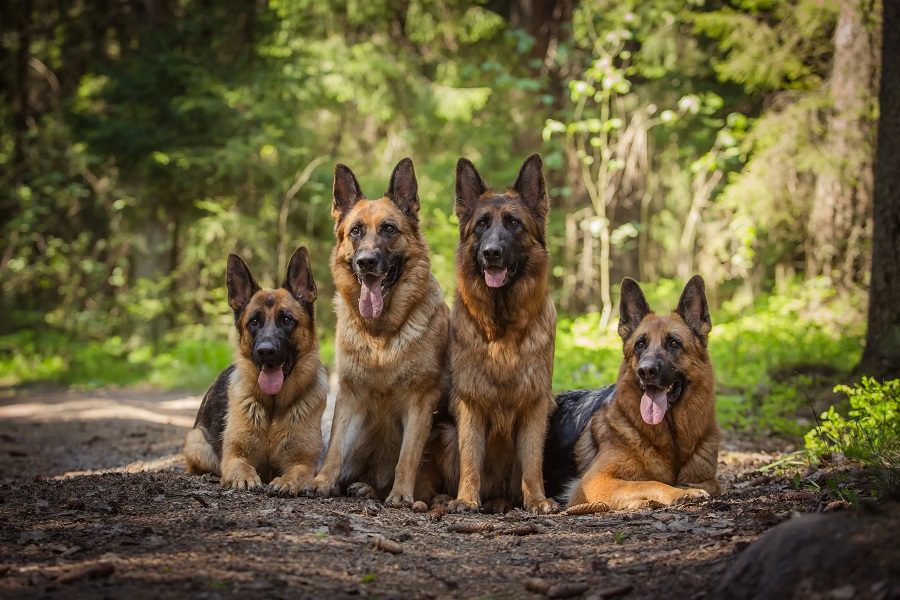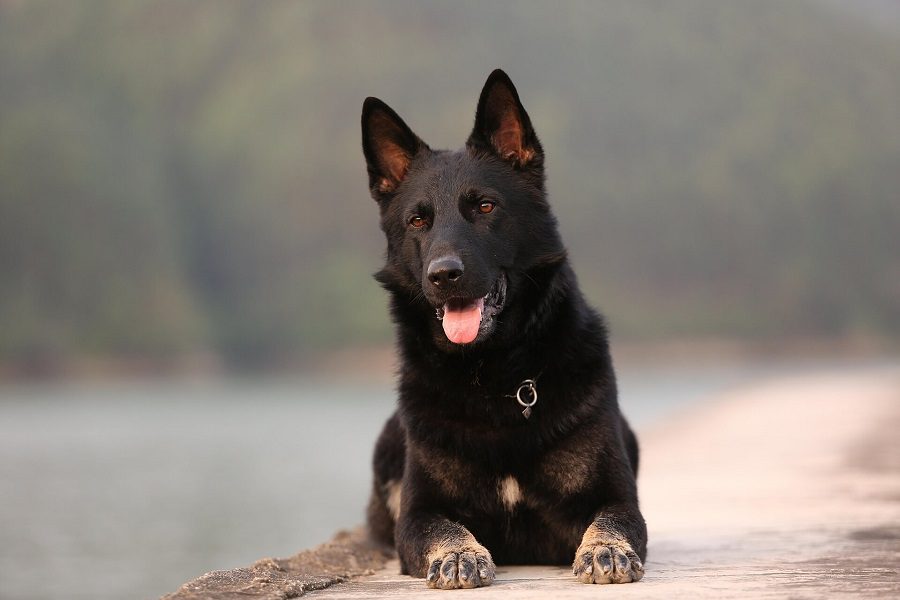Last Updated: 7 months ago
Parvo is a scary and painful illness that threatens all dogs who aren’t vaccinated.
Puppies are especially at risk of contracting the potentially life-threatening virus.
As a German Shepherd owner, you want to make sure you are doing everything in your power to keep your dog healthy and happy. If your dog has parvo, don’t feel like you failed as a puppy parent.
Treatment will be effective in the overwhelming majority of cases.
The important thing is to start treatments as soon as possible and make sure you are prepared for every possibility. So in this article, you’ll get information about what parvovirus is, what the symptoms are, how it is treated (including tips for home treatment), and how it can be prevented (including key information about vaccination).
You’ll have all the information you need to know what to do if your German Shepherd gets parvovirus.
Parvo is spread primarily through fecal matter, and it is very, very contagious. Even a small speck of parvo carrying fecal matter brought in the house on the bottom of your shoe could be enough to get your unvaccinated dog sick.
And if any pet in your house has it, strict quarantine is essential to keep your other pets safe. While it is so easy to spread, parvo is specific to dogs. So if your dog has parvo, your cats (and the humans in your family) are safe.
When left untreated, parvo has an extremely high mortality rate. So it’s extremely important that you know how to recognize the symptoms so that you can start treatments as soon as possible.
Symptoms Of Parvo In Dogs
Symptoms start to become noticeable about 5 or 6 days after the dog has been infected.
If you don’t see symptoms but you are still worried, you can have a stool sample from your German Shepherd tested for the virus.
Aside from that, symptoms include:
- Vomiting
- Diarrhea (unusually smelly and often with traces of blood)
- Fever
- Lack of energy, lethargy
- Lack of appetite
- A drop in white blood cell count (you can’t detect this yourself but it can be tested by a vet)
The threat of parvo lies in these very symptoms. If left untreated, vomiting and diarrhea (and the lack of appetite) will become so severe that the dog will dehydrate and starve. And if that doesn’t kill them, the risk of bacterial infection wreaking havoc on their severely weakened immune system will.
Essentially, parvo will weaken your dog until it no longer has the strength to fight the virus. This is a painful and tragic process to watch. We are not trying to scare you but simply prepare you and make sure you understand just how important it is to get treatment for your dog as soon as you notice these symptoms.
Whether or not it’s parvo, vomiting, and diarrhea that last more than 48 hours warrant a visit to the vet. These symptoms indicate a serious illness that might be parvo or might be something else but, in either case, should be treated.
When left untreated, parvo will almost certainly kill your dog.
Untreated parvo has a mortality rate of 91% meaning the chances of survival without treatment are nearly zero.
With treatment, however, most dogs will recover. Treated parvo has a mortality rate of just 20% or even as low as 5%, meaning that the vast majority of treated dogs will recover and survive the virus when they are treated.
So with those statistics in mind, read more about what treatment actually involves.
Parvo Treatment
Once parvo takes hold, you and your German Shepherd will have a tough road ahead of you. However, survival is possible and, in fact, if treated, the overwhelming majority of dogs will survive a battle with parvovirus.
The problems begin when you don’t get treatment or wait too long to get treatment. The biggest health risk is dehydration. With the diarrhea and vomiting, your dog is losing a lot of fluids. They will not be able to drink water quickly enough to replace the lost fluids.
Alongside dehydration, they are losing a lot of nutrients and their lack of appetite prevents them from restoring those lost nutrients. As their body weakens from these things, they become less capable of fighting the virus and they became more susceptible to secondary bacterial infections.
So, with that in mind, treatments typically involve keeping your dog connected to an IV with a saline solution and/or a nutritional supplement that can help keep your dog hydrated and nourished enough to stay strong through the fight against the virus.
Because it requires an IV, most parvo cases are treated by hospitalization which can get expensive. We’re talking bills running into the thousands. It is possible to do this treatment at home. But you will need instructions and training from your vet to learn how to administer the IV and how to care for your German Shepherd properly while it heals.
If you plan to do home treatment, you also need to be prepared to invest a lot of time into caring for your pup while it recovers. Your German Shepherd should not be left alone at any point while it is battling parvo. Someone needs to be with them at all times.
Treatment at home will involve:
- Quarantine. Parvo can’t spread to humans but it can spread very, very easily to your other pets. Keep your sick dog quarantined to a specific room or area of the house until they are virus free.
- Sanitation. You need to be extra vigilant about cleaning and keeping your home sanitized during this period. Thoroughly clean food and water dishes with soap and water daily. Vacuum and mop 2-3 times per week. Wash your hands before and after handling your ill dog.
- Hydration. It is possible to learn to do an IV on your own. Do not skip this. Dehydration is the most pressing threat (followed by nutrient loss and bacterial infection).
- Antibiotics. Your vet will likely prescribe a course of antibiotics that are probably given via injection. Make sure that you administer these as instructed and use the full course of treatment even after your dog appears to be fully recovered.
- Relieve symptoms. Use other medicines (or herbal supplements like the one mentioned below) to help alleviate the painful symptoms of parvo. This will keep your dog more comfortable and help give them the strength they need to recover from parvo more rapidly.
Here is one of our favourite herbal supplements for treating parvovirus:
Paxxin All-Natural Parvo Aid
This is an herbal supplement created to help animals recover from parvo. It helps treat symptoms like digestive distress, and it also stimulates appetite. It’s a soothing herbal treatment that can help ease the painful symptoms your dog is experiencing.
If given to your dog before symptoms show (for example, if you suspect they might have contracted parvo), it is very effective at eliminating the illness before it has a chance to cause serious damage.
However, if symptoms are visible, this will not be a strong enough treatment on its own. As mentioned, keeping your dog hydrated (via IV bags) will be essential. But in this more severe case, Parvaid can successfully be used to help speed up your dog’s recovery.
So, Parvaid is perfect if you have a dog too young to get the vaccination but still at risk of contracting parvo, or if you suspect your dog might have been exposed to parvo and you want to prevent the virus from taking hold.
Preventing Parvovirus
Prevention is the best way to keep your dog healthy and happy. It is the cheaper and nicer option. Fortunately, it’s also very easy. There is a vaccination that you can get to make your German Shepherd immune to parvo.
Parvo Vaccination
The parvo vaccine is very affordable (usually no more than about $20), and it’s often combined with other vaccinations so that you can protect your dog from multiple potential illnesses in one easy shot.
You can get your dog vaccinated at the vet, or you can buy an injection and do it yourself. Here are a few things to be aware of when you are getting your dog vaccinated:
- Your German Shepherd should be at least 8 weeks old before you start the vaccinations. So if your puppy is still too young to get vaccinated, make sure to be extra vigilant about the other at-home prevention methods discussed below.
- The first vaccination will happen in a series of (typically) three separate vaccinations. These are given every 3 to 4 weeks.
- After this initial course of vaccinations, you’ll need to get a booster shot for your dog once a year to make sure they get maximum protection from parvo.
- Dogs that are currently sick or pregnant (or suffer from an immune system disorder) should not be vaccinated. So if any of those things are possible, see a vet before vaccinating. If your dog has had allergic reactions to other vaccines in the past, talk to your vet before giving it the parvo shot.
Overall, vaccination is the best way to keep your dog safe from parvo.
The at-home prevention methods discussed below are very helpful, but no matter how vigilant you are, it’s simply not possible to completely control your environment. So the parvo vaccination is your failsafe that will ensure your dog is protected.
At-Home Prevention
Whether our dog is too young for vaccination or otherwise unable to get the vaccine, at-home prevention is important. Parvovirus is highly contagious and super easy to spread. It can also survive for an unusually long time, even without a host.
This means it can lie in wait for a long time on food bowls, floors, dirty shoes, or dirty paws until it has a chance to enter your German Shepherd’s system and start wreaking havoc.
So the best thing you can do to prevent parvo at home is to practice proper sanitary methods that keep your home clean and free of parvo. Follow these tips to create a safe, parvo-free environment for your pets:
- Train pets to have a “toilet” area. Parvo spreads primarily through faecal matter. So faeces in your yard could be hosting the deadly virus. Minimise this threat by either training your dog to use a specific section of the yard only (for easier clean-up on your part) or just making sure you are regularly scooping poop from your yard. This doesn’t completely eliminate the threat since residue will still remain on the grass. But if you’ve got a dog that likes to eat faeces, keeping the yard faeces-free is an important first step in keeping your dog safe.
- Keep unvaccinated pets indoors. You have more control over the indoor environment than the outdoor one. If your pets aren’t vaccinated yet, keep them indoors until they are. If they are not able to get vaccinated at all, this may not be a practical option, but it’s recommended for the short term when you are just waiting until your pup is able to get the vaccine.
- Clean floors and surfaces with (diluted) bleach. Mix about half a cup of bleach with a gallon of water. Use this mixture to clean floors. This will help remove any lingering parvoviruses.
- Leave your shoes outside. You could unknowingly be tracked in parvo from the outside world across your carpet and floor by wearing shoes in the house. Take them off before you come in to keep your home pest-free.
- Wash your hands. Wash your hands as soon as you come home. Especially if you have come into contact with any other dogs while you were out.
- Keep an eye out for symptoms. The earlier you can catch parvo, the better. Keep an eye out for the symptoms described earlier. Consider using Parvaid or something similar if your dog might have been exposed. For example, if you took them to a dog park, caught them eating faeces, or recently took them to the vet, This can stop the virus in its tracks.
With this information, you are now prepared to protect your German Shepherd from the dangers of parvo. So if they haven’t been vaccinated (or you have a rescue and you’re not sure they have been), go get them vaccinated now if they are able.
And if your dog already has parvo, get them started on treatment immediately. Whether you choose to hospitalise them or treat them at home, it’s important to consult a vet as soon as you notice any suspicious symptoms and be aware of exactly what your dog needs in order to recover and survive this battle with parvo.
It’s a scary illness, and it’s hard to watch your lovable pup suffer through it, but with your help and support, they can beat it.
So remain alert and remain dedicated to their health. Your German Shepherd can beat this!



